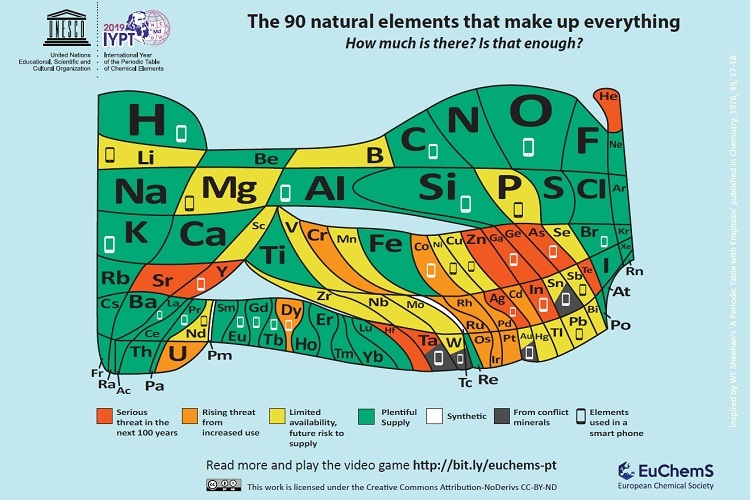Chemical elements which make up mobile phones placed on ‘endangered list’

Scientists from the University of St Andrews have developed a unique periodic table which highlights the scarcity of elements used in everyday devices such as smart phones and TVs.
Chemical elements which make up mobile phones are included on an ‘endangered list’ in the landmark version of the periodic table to mark its 150th anniversary. Around ten million smartphones are discarded or replaced every month in the European Union alone. The European Chemical Society (EuChemS), which represents more than 160,000 chemists, has developed the unique periodic table to highlight both the remaining availability of all 90 elements and their vulnerability.
The unique updated periodic table will be launched at the European Parliament today (Tuesday 22 January), by British MEPs Catherine Stihler and Clare Moody. The event will also highlight the recent discovery of the oldest known wallchart of the Periodic Table, discovered last year at the University of St Andrews.
Smartphones are made up of around 30 elements, over half of which give cause for concern in the years to come because of increasing scarcity – whether because of limited supplies, their location in conflict areas, or our incapacity to fully recycle them.
With finite resources being used up so fast, EuChemS Vice-President and Emeritus Professor in Chemistry at the University of St Andrews, Professor David Cole-Hamilton, has questioned the trend for replacing mobile phones every two years, urging users to recycle old phones correctly. EuChemS wants a greater recognition of the risk to the lifespan of elements, and the need to support better recycling practices and a true circular economy.
Professor David Cole-Hamilton said: “It is astonishing that everything in the world is made from just 90 building blocks, the 90 naturally occurring chemical elements.
“There is a finite amount of each and we are using some so fast that they will be dissipated around the world in less than 100 years.
“Many of these elements are endangered, so should you really change your phone every two years?”
Catherine Stihler, Labour MEP for Scotland and former Rector of the University of St Andrews, said: “As we mark the 150th anniversary of the periodic table, it’s fascinating to see it updated for the 21st century.
“But it’s also deeply worrying to see how many elements are on the endangered list, including those which make up mobile phones.
“It is a lesson to us all to care for the world around us, as these naturally-occurring elements won’t last forever unless we increase global recycling rates and governments introduce a genuine circular economy.”
Pilar Goya, EuChemS President, said: “For EuChemS, the supranational organisation representing more than 160,000 chemists from different European countries, the celebration of the International Year of the Periodic Table is a great opportunity to communicate the crucial role of chemistry in overcoming the challenges society will be facing in the near future.”
The new Periodic Table can be viewed online.
'The Periodic Table and us: its history, meaning and element scarcity' takes place at The European Parliament, Brussels, Belgium on 22 January 2019. The two-hour session features speakers from the chemical sciences as well as representatives from the European Parliament and the European Commission.
This year (2019) is the United Nations International Year of the Periodic Table (IYPT2019) and the 150th anniversary of scientist Dmitri Mendeleev’s discovery of the periodic system as we now know it. Natalia Tarasova, Past-President of the International Union of Pure and Applied Chemistry (IUPAC), will present the IYPT2019.
The Periodic Table of chemical elements is one of the most significant scientific achievements and is today one of the best-known symbols of science, recognised and studied by people around the globe.
EuChemS, the European Chemical Society, coordinates the work of 48 chemical societies and other chemistry related organisations, representing more than 160,000 chemists. Through the promotion of chemistry and by providing expert and scientific advice, EuChemS aims to take part in solving today's major societal challenges.
For media queries related to Pilar Goya, EuChemS President, contact [email protected] Tel: +32 (0)22892567
For media queries related to Catherine Stihler MEP, contact [email protected] Mob: 07753 904 531.
Issued by the University of St Andrews Communications Office.